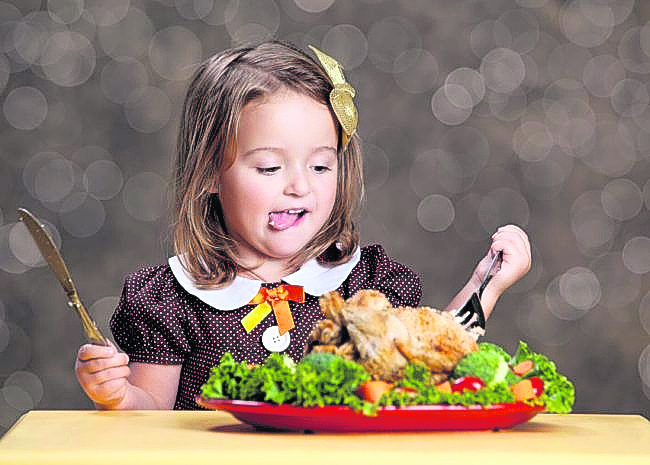“Everybody knows a turkey and some mistletoe. Help to make the season bright.
Tiny little tots with their eyes all aglow… Might find it hard to eat the food you provide.” Ahh, the Holidays. No matter which one you celebrate, they all have two things in common: Family and Food!
However, if you have a picky eater, this magical season can come with anxiety and stress of relatives asking (and at times judging) why your child is not eating grandma’s famous green beans or aunt Becca’s matzo ball soup. So, we’ve put together a list of helpful tips to get you and your child through these gastronomic challenges this holiday season.
- “To be prepared is half the victory.” de Cervantes.
Picky eaters crave control and need your help building trust with food. So, prepping ahead is on top of my list. Talk to your child about the holidays and food traditions associated with them. Books like “What’s for Thanksgiving Dinner “by Sally Huss can help with the preparation of the upcoming meals. YouTube videos about how to cook different dishes are great visuals you can watch together and even try to replicate for a hands-on sensory experience.
Another way to help prep is to talk about the upcoming menu and help your child pick one or two items he would like to try. Remember children do their best when they know what to expect and what their choices are.
- “Cooking is not just eating energy. It’s an experience.” Guy Fieri.
Make the meal a fun hands-on experience. Pick a dish or two and try to make it with your child. One of my favorite ingredients to experiment with is a potato. Kids get excited when they realize that the potato can transform itself into so many different textures, colors, and flavors. You can even come up with fun names for dishes, like “Hulk Smashed Potatoes’. Take time to help your child process what the dish looks like, tastes like or feels when touching or eating.
- “A hungry stomach cannot hear.” La Fontaine.
Offer your child a small amount of food or a snack before you leave the house or guests arrive. Starving your child will not be best when he is not in his daily environment. When overwhelmed with new foods, people, and or places, it’s easy for kids to shut down. So make sure he has a good snack, however not too much so he’s still curious and willing to try something new without the need to fuss about being hungry without his familiar foods.
- “Don’t tell me. Show me!” Unknown.
Lead by example. One of the simplest recommendations I give parents is if you want your child to eat something, you should eat it too. Don’t put rice on their plate and not put any on yours. Be a role model for your child’s eating habits. The same should be applied around the holidays.
The good thing about the holidays is that there’s a high probability there will be plenty of other children around, who can serve as foodie role models. Consider setting up a kids’ table, where kids can be themselves away from the constant scrutiny of aunt Karen. According to an article in Physiology Today titled Why Children Make Great Role Models (Oct 2017):
“Children make some of the best role models, simply because their original nature is to be purely and authentically themselves as well as their natural ability to be fully present in the here-and-now, experiencing everything through their five senses in a state of unadulterated awareness. ”
Think about how this can help other kids who are weary and distrustful of food. Seeing other kids trying and enjoying foods at the same table can be the perfect model your child needs.
- “If it is not good enough for your eye, why is it good enough for your stomach?” – Yourofksy.
Most kids eat with their eyes first. So keep servings small and limit the number of items on their plate to a max of 2 or 3 different items. My rule of thumb is, it’s better to offer seconds than remove an unfinished plate. Kids need to feel a sense of success and offering too much volume and variety might visually overwhelm your child. Offer small amounts and plenty of praise when your child has been able to finish his meal.
- “There’s no fear when you’re having fun.” – Will Thomas.
Take the focus away from eating and instead make the day fun and interactive. Have your child help with setting the table, come up with a theme for the meal, make some arts & crafts centerpieces, etc. Playing fun games or activities like decorating cookies or stuffing the pretend turkey, can help remove anxiety around eating and shift the child’s anticipation to something fun and relaxing.
- “Don’t get your tinsel in a tangle.” – Unknown.
Excitement, anxiety, anticipation, all these feelings can alter and affect your child’s appetite. So go easy on your child and also on yourself. It’s a given, family members will most definitely offer advice, and usually, it comes from those who you least expect it. The best reaction is no reaction. Smile and move on.
![]()
Dr. Ellen Braaten, an HMS associate professor of psychology at Massachusetts General Hospital was quoted in an article titled Holiday Stress and the Brain saying: “People who feel stressed during the holidays should decide what they want the holidays to mean to them and keep their expectations for the season realistic.” Remember the reasons you’re celebrating the holidays in the first place and let that be your focus.
We hope these ideas make you feel empowered and ready to take on the holidays. As always, we appreciate your feedback. Send us a message and let us know what you think.
“So I’m offering these simple tips
For kids from one to ninety-two
Although’ it’s been said many times, many ways
Happy Holidays to you!”
ABOUT CINDY HERDE
“I was born and raised in Aruba, which fostered my fluency in four languages and my passion for the language arts. After graduating with my master’s degree from the University of Central Florida – GO KNIGHTS! – I had the opportunity to move around the country and work in Orlando, Boston, and Chicago, before settling in sunny Miami with my husband and 2 kids. At each of these career stops I was fortunate to be part of extensive pediatric medical teams, working closely with and learning from fellow speech therapists, physical therapists, occupational therapists, nutritionists, lactation consultants, pediatricians, gastroenterologists, neurologists, early developmental specialists, respiratory therapists, behavior analysts, nurses, special education teachers and of course, parents and caregivers. Throughout my career I’ve enjoyed being an advocate for families whose primary language is not English, and treasured the opportunities that I’ve had to help these and multiple other families along their feeding journey.
However, becoming a parent in the spring of 2015 completely transformed my career perspective and approach. I now understand the anxieties and concerns that come with parenthood, and it has allowed me to become a different type of clinician… one who’s more empathetic and focused on educating families and providers. Spurred by this new found passion, and armed with 14 years of pediatric field experience, I’ve decided to venture into a new approach to therapy.”




















